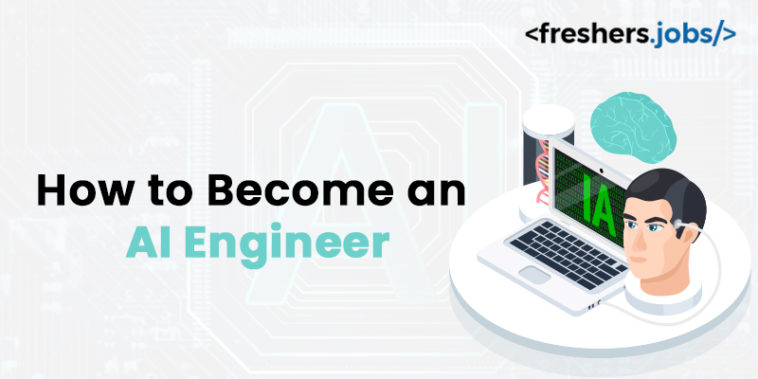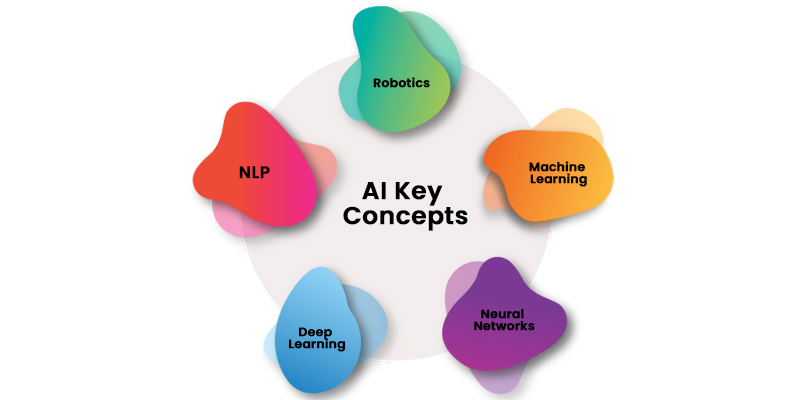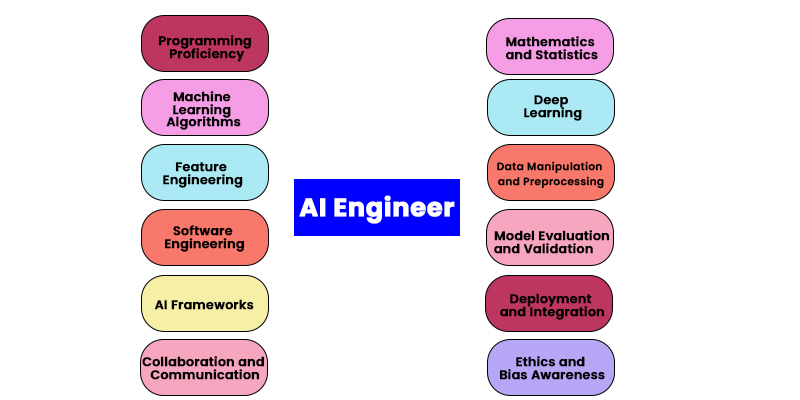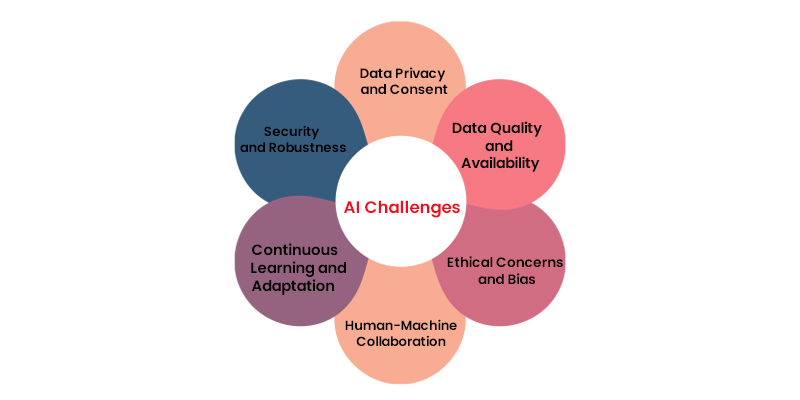In a world where technology is rapidly shaping the future, artificial intelligence (AI) stands as one of the most transformative and promising fields. AI has revolutionized the way we interact with machines and the world around us.
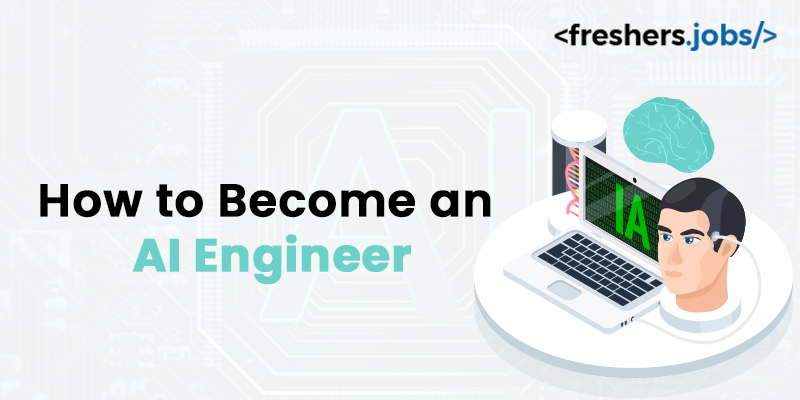
If you are a freshers jobs seeking graduate who is fascinated by the idea of designing an intelligent system that can learn, reason, and make decisions, and have skills in AI, then you can definitely seek AI Engineering as your career. So in this blog, we will delve into what Artificial Intelligence is, its key concepts, challenges, and tips for how to become ai engineer.
What is Artificial Intelligence?
Artificial Intelligence (AI) is referred to as a field of computer science which involves the creating, programming, and designing of machines that think similar to a human brain. AI systems are created to perform tasks that generally require human intelligence, such as problem-solving, speech recognition, language translation, visual perception, decision-making, and more.
Who are AI Engineers?
Artificial intelligence engineers are individuals who use AI and machine learning techniques to develop systems that can help organizations in increasing efficiency, profits and making better business decisions. The field of AI engineering includes diverse job opportunities spanning various industries and domains.
The main objective of Artificial Intelligence Engineering is to develop the tools, systems, and processes that enable artificial intelligence to be applied in the real world. Any application where machines perform human functions, such as solving problems and learning, can be considered artificial intelligence. Algorithms are trained by data, which helps them to learn and perform better. AI can be categorized into two main types:
- Narrow AI: It is designed and programmed for a specific task or trained to perform a narrow range of tasks. It excels at performing these tasks, but its intelligence is limited to the scope of its programming. Examples of narrow AI include voice assistants like Siri and Alexa, recommendation systems on streaming platforms, and self-driving cars.
- General AI: General AI refers to machines which are programmed with human-like intelligence that can understand, learn, and apply knowledge across diverse tasks, similar to how humans do.
Sutherland offers various job opportunities for freshers. Interested candidates can click Sutherland Jobs For Freshers to look for various job openings relevant to their skills and abilities.
Key Concepts of Artificial Intelligence
Listed below are the key concepts of Artificial intelligence engineering.
- Machine Learning: Machine learning involves training algorithms to learn patterns from data and making predictions or decisions without being explicitly programmed. It encompasses techniques like supervised learning, unsupervised learning, and reinforcement learning.
- Neural Networks: Neural networks are referred to as a set of algorithms inspired by the structure and functioning of the human brain. They are used in deep learning, a subfield of machine learning, and have led to significant breakthroughs in tasks like image and speech recognition.
- Deep Learning: Deep learning will use neural networks with many layers (deep neural networks) to analyze and learn from data. It has been successful in tasks such as image and speech recognition.
- Natural Language Processing (NLP): NLP focuses on enabling computers to understand, interpret, and generate human language. It’s used in applications like language translation, sentiment analysis, chatbots, and more.
- Robotics: Artificial intelligence engineering and robotics combine to design intelligent machines that can interact with the physical world. Robotic systems can range from simple industrial robots to advanced autonomous drones.
AI Engineering Responsibilities
Here are some tasks and responsibilities of an AI engineer
- Establish and manage the infrastructure of AI development and production.
- Perform statistical analysis and intercept the outcomes to enhance the decision-making process of the organization.
- Implement automated AI infrastructures to support the data science team.
- Construct AI models and provide assistance to product managers and other stakeholders in analyzing and implementing them.
- Convert machine learning models into APIs suitable for easy integration with other applications.
- Engage in cross-team collaboration to facilitate the adoption of AI and promote the implementation of best practices.
If you are looking for job vacancies in Kolkata, then you can look for job opportunities available in that city. Visit fresher job openings in Kolkata to find job roles that are relevant to your skills.
Tips to Become an Artificial Intelligence Engineer
To become an AI engineer, you should have basic computer, information technology (IT), and math skills, as it is essential for Artificial intelligence programming. Here are some tips for how to become ai engineer.
- Programming Proficiency: Strong programming skills are the base of Artificial Intelligence engineering. Python programming is the go-to language for AI development due to its extensive libraries and frameworks like TensorFlow, PyTorch, and sci-kit-learn. Adept programming skills enable AI engineers to design, implement, and optimize complex algorithms and models.
- Mathematics and Statistics: A solid skill in mathematics and statistics is essential for understanding the underlying principles of machine learning. Concepts like linear algebra, calculus, probability, and statistics play a pivotal role in designing, training, and evaluating AI models.
- Machine Learning Algorithms: AI engineers must have a solid knowledge of various machine learning algorithms. This knowledge will be very helpful at the time of choosing the right algorithms for specific tasks and model performance.
- Deep Learning: Deep learning has transformed the AI landscape, and proficiency in building and training neural networks is essential. Understanding architectures like convolutional neural networks (CNNs), recurrent neural networks (RNNs), and transformer models empowers engineers to tackle complex tasks like image recognition, natural language processing, and more.
- Feature Engineering: Crafting meaningful features from raw data can greatly impact model performance. AI engineers need to possess the ability to engineer relevant features that capture essential information and enhance model accuracy.
- Data Manipulation and Preprocessing: A comprehensive portion of artificial intelligence engineering involves working with data. Engineers need to clean, preprocess, and transform data into a suitable format for training models. Proficiency in using libraries like pandas is vital for efficient data manipulation.
- Software Engineering: Developing scalable, maintainable, and robust AI systems require software engineering skills. Version control, code documentation, and adherence to coding standards ensure collaboration and smooth integration of AI solutions into existing infrastructure.
- Model Evaluation and Validation: AI engineers need to evaluate model performance using appropriate metrics and validation techniques. This skill helps in detecting overfitting, underfitting, and optimizing models for real-world deployment.
- AI Frameworks: Proficiency in AI frameworks like TensorFlow, PyTorch, and sci-kit-learn is essential for building and training models efficiently. These frameworks provide tools to handle complex operations, manage data pipelines, and deploy models.
- Deployment and Integration: Converting AI models into practical applications requires skills in deploying models as APIs or integrating them into existing systems. Knowledge of cloud platforms is valuable for seamless deployment.
- Collaboration and Communication: Effective collaboration across teams and clear communication of technical concepts are vital. AI engineers often work alongside data scientists and product managers, necessitating excellent teamwork and communication skills.
- Ethics and Bias Awareness: As AI technologies impact society, understanding ethical considerations and biases in AI systems is crucial. AI engineers should contribute in the development of fair, transparent, and unbiased models.
The field of AI engineering demands a diverse skill set that combines technical expertise, problem-solving abilities, and a better understanding of machine learning principles. If you aspire to become an AI engineer, you need to master a range of ai engineer skills to excel in this dynamic and rapidly evolving domain.
Challenges in Artificial Intelligence
AI engineers and researchers face a range of complexities when they try to develop advanced systems and technologies. These challenges span technical, ethical, and practical dimensions, shaping the landscape of AI engineering. Here are some of the prominent challenges
- Data Quality and Availability: Artificial Intelligent models involve large and high-quality datasets for training. Obtaining relevant, diverse, and accurate data can be a huge challenge, and issues like bias, noise, and incomplete data can impact the performance and fairness of AI systems.
- Ethical Concerns and Bias: AI systems can unintentionally increase biases present in training data, which leads to unfair outcomes and discrimination. Addressing ethical concerns, ensuring transparency, and reducing biases are major aspects of responsible AI development.
- Human-Machine Collaboration: Balancing the role of ai and humans in decision-making and tasks requires careful designing. Creating interfaces and interactions that maximize the strengths of both humans and AI systems is a complex challenge.
- Continuous Learning and Adaptation: AI models often face challenges when presented with new, unseen data or scenarios. Building models that can adapt and learn continuously is essential to make sure their relevance and accuracy over time.
- Security and Robustness: AI systems can lead to possibilities for malicious attacks, where small, carefully crafted changes to input data can lead to incorrect predictions. Ensuring the security and robustness of AI models is a challenge in critical applications.
- Data Privacy and Consent: Collecting and using user data for training AI models leads to privacy concerns. Ensuring proper consent, data anonymization, and compliance with privacy regulations is essential.
In conclusion, Artificial Intelligence plays a major role in the current technological environment. AI engineering involves the combination of technical skills, creative thinking, and problem-solving skills. The field of AI is ever-evolving, with new innovations emerging regularly. Staying up-to-date with the latest developments and expanding your skill set is very important for your career success. So in this blog, we discussed what is ai, its key concepts, challenges and tips to become an AI Engineer.

